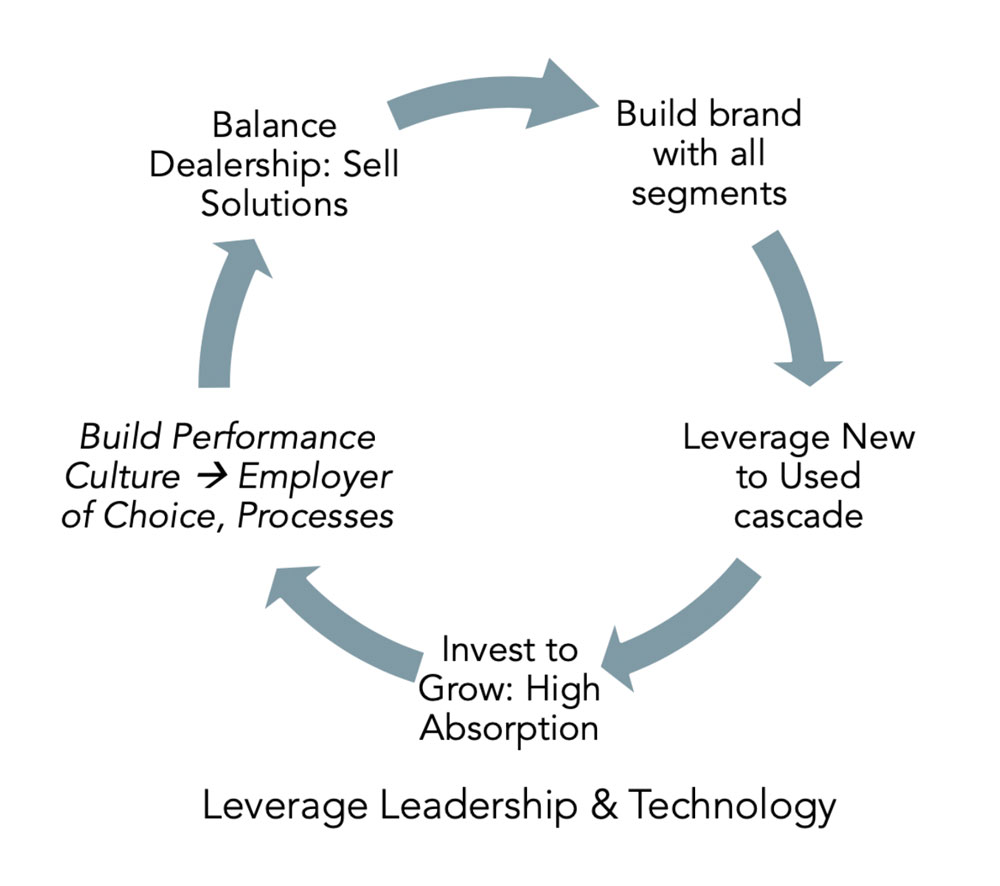“Culture eats strategy for breakfast” — a quote attributed to management guru Peter Drucker defines the core idea of this spoke. The best plans fail without a strong culture to support them. On the flip side a strong culture means your dealership is more likely to overcome setbacks and changes even without a strong strategy.
To grow from good to great requires more than a strong culture — being great requires a culture of performance.
Performance means discipline, rigor, consistency and willpower to succeed. These behaviors must be demonstrated by everyone on your team. These same characteristics must define the robust and vital processes in your dealership.
A more recent guru, Simon Sinek, made it personal saying, “So goes the leader, so goes the culture. So goes the culture, so goes the company.” As the leader, it is your job to build both:
- A culture that makes your dealership the Employer of Choice, and
- A culture that leverages vital processes.
This spoke is so important that we’ll cover it in two articles starting with Vital Process — the processes in each Department that must work well.
Service Department
The service department is arguably the most important one in the dealership, so we’ll start there with the work order (WO) management process. It is vital because without a good one, the dealership will likely fail. When done well, the dealership can be great.
Good dealerships have a WO process that defines the work for the technician and tracks the labor hours and parts to fix a machine. Great dealerships expand the use both on the front and back end. On the front end, a good dialogue with the customer about the problems with the machine, and the level of performance they expect after the repair, sets the proper expectations up front for the customer and for the technician. It means a more accurate estimate or quote. During the repair, as things change or new priorities arise, so must changes to the WO happen in real-time, often requiring communication back to the customer. On the backside, a robust WO process helps reduce WIP and improves margin and cashflow.
Parts Department
The successful parts department achieves the proper balance between having the right parts to meet customer expectations and turning inventory fast enough to use capital wisely. This balance is best met by building a robust process to define which parts to stock and which to order only if and when requested. So simplify and define two kinds of parts only:
Stocking parts for which 100% fill is the benchmark, and
Non-stock parts for which 0% fill is the benchmark. If you’ve decided not to stock a part, send them back.
In Great dealerships, the stock/non-stock decision extends beyond the parts manager and involves service and wholegoods also. There are parts for which there is not enough history to stock and so a management decision is required. Likewise, there might be parts with multiple hits but are an unusual demand and stocking is not warranted.
Wholegoods
In good dealerships, the sales reps work hard to find good deals. They are like birddogs. They go where they have found success and, to expand the canine metaphor, they are lone wolves looking for their next meal.
In great dealerships, the time and effort of the sales reps is robustly managed by the sales manager in a process that measures and improves:
Activity: Number of calls, quotes and sales
Quality of Calls: Product knowledge, communication and sales skills
Allocation of Effort: To A&B prospects, existing & conquest accounts
Sales reps in a great dealership are professionals who sell the entire dealership and who achieve higher margins on both new and used. A good sales management process is vital for this.
Administrative Departments
In defining Spoke #2 about the importance of achieving high absorption we highlighted the importance of controlling expenses. Good dealerships budget expenses and review them regularly.
Great dealerships know the best practice benchmarks and then replace expenses — mainly people — with processes that are more efficient and more valuable to the customer and the dealership.
The administrative departments must provide accurate information as well as maintain the information technology to support the entire dealership.
In every department of a good dealership, the need to hire, train and retain good people happens as needed, often with unexpected turnover. In great dealerships, the need and processes to do these things is constant and turnover is low. They are employers of choice.
More about that part of the spoke next month.







